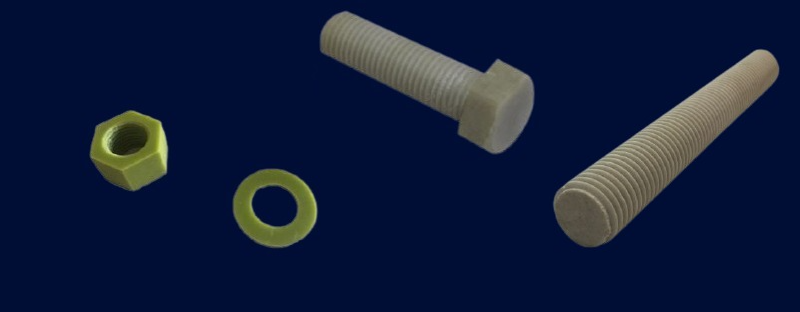FRP Fasteners
FRP fasteners are employed in technical sectors where electrical, chemical, and thermal properties are critical. Glass fibre reinforced epoxy or polyester resin systems with particular additives and a unique structure are used to make our offered fasteners. Explore our website to discover our diverse range of other FRP products.
FRP fasteners have the following advantages over steel fastening:
- a lot lighter
- Insulating both electrically and thermally
- Durable and Corrosion resistant
- Defiant in the face of adversity
Properties of FRP Fasteners
- ELECTRICAL PROPERTIES: FRP fasteners are non-magnetic and electrically insulating. Furthermore, partial discharge is free to large electric field strengths and is particularly non-tracking. They’re great for transformers, electrical engineering, high-frequency switching, and electrostatic powder coating.
- CHEMICAL PROPERTIES: FRP fasteners are particularly resistant to strong fluids and gases, as well as transformer oil and dielectric liquids. They are also UV and weather resistant.
- THERMAL PROPERTIES: When compared to steel (15-58 W/mk), frp threaded rods, bolts, and nuts have a very low thermal conductivity of 0.3 W/mk, which puts them on par with mineral wool, which is used as insulation in construction. They’re perfect for use in refrigeration, HVAC, and other applications where thermal bridges are a concern.
- COMPOSITE FASTENERS ARE LIGHTWEIGHT: Composite fasteners have a density of 1.9 t 2 g/cm3 and hence weigh about a quarter of the weight of steel. They’re ideal for applications where weight reduction is critical, such as vehicle construction or the fabrication of wind turbine nacelles.
- HIGH TENSILE STRENGTH: Threaded rods manufactured of thermoplastics, such as polyamide frp, offer a six-fold higher tensile strength than threaded rods made of metal.
Fields of application:
- Flue gas desulphurization plant
- Onshore / offshore engineering
- Chemical plants
- Hydraulic engineering, sewage treatment plants, desalination of seawater
- Transformers, dry-type and oil immersed
- Generators
- Switchgears
- Instrument construction, High-frequency Systems
- Traffic engineering
- Refrigeration and air conditioning
- Cable trays
- Electrostatic powder coating
- Electroplating plants
